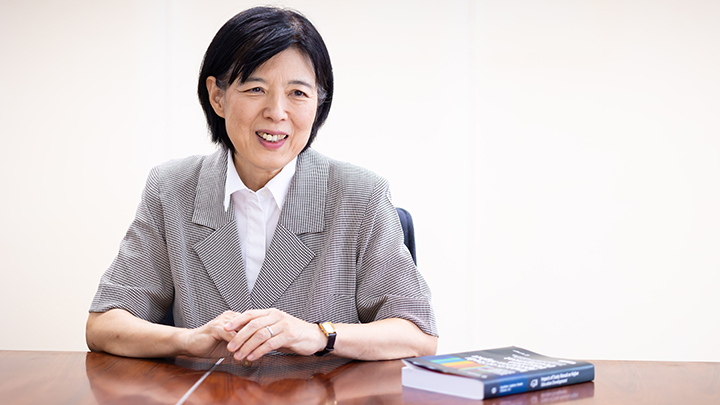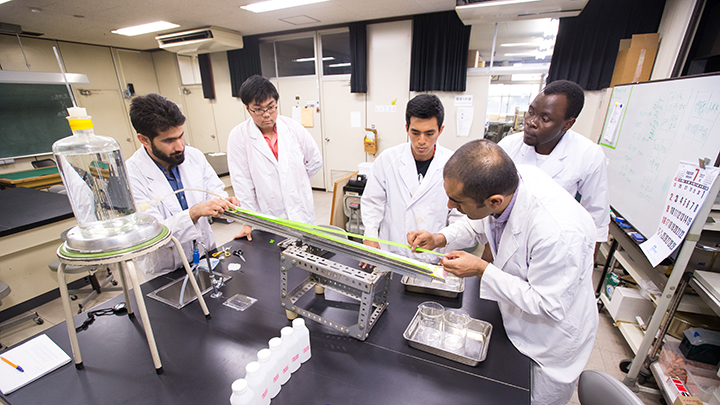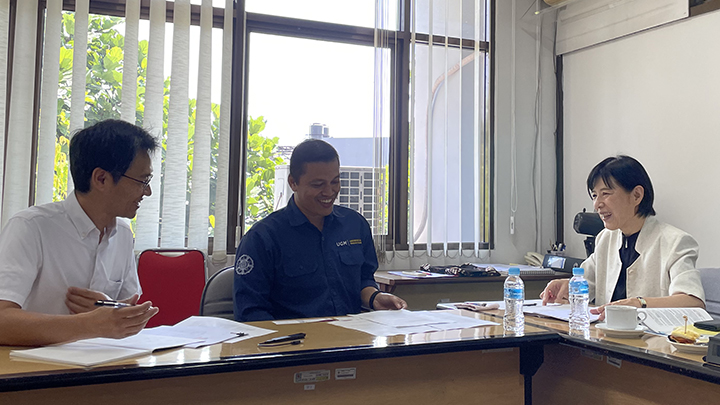Interview With Senior Research Advisor Kayashima Nobuko: Unraveling the Current State of Higher Education to Show the Significance of Studying Abroad
2024.12.09
When scholars from developing countries study abroad, what impact do their experiences have on their home countries? Kayashima Nobuko
, Senior Research Advisor, JICA Ogata Sadako Research Institute for Peace and Development (JICA Ogata Research Institute), led a research project to find the answer to this question. Bearing in mind the changes around education in developing countries, we asked her about the findings from a large-scale study that looked at faculty members of academic institutions in ASEAN member states.

―At JICA, you have been working on educational development in developing countries for many years. What first made you interested in the field of education?
The World Conference on Education for All, held in Thailand in 1990, brought about a paradigm shift for educational development in developing countries: the importance of developing basic education was shared globally. In Japan, basic education was previously believed to be part of the basis of a country that should not be intervened by aid from other countries. However, following this conference, Japan’s attitude changed, and since then, basic education has been regarded as the foundation of development, thus important in development assistance.
While the discussion leading up to this conference was becoming increasingly active, I had the opportunity to study for two years, from 1987 to 1989, at the Faculty of Education, Paris Descartes University (Paris V), and at the International Institute for Educational Planning, UNESCO. There I met administrative officers from developing countries who were working in the field of education. They remarked that education is the foundation of people’s lives and cannot be ignored in development work. For me, their perspectives were completely new and interesting and served as a turning point for me to pursue a career in educational development.
―Since then, the trends in educational development in developing countries have been constantly changing. What are the current challenges?
I think there are mainly two challenges. The first is the diversification of issues in each country. At the World Conference on Education for All
, an international consensus was reached to make “basic education for all” a globally shared goal, but more than 30 years have passed since then. In some developing countries, primary and secondary education has become universal with economic development and the enrollment rate of higher education has increased. Meanwhile, there are countries and regions where the development of basic education is still in need. The challenges in educational development used to be relatively similar among developing countries but today, we are unable to describe the status of different developing countries collectively. The challenges are more varied. The situation is more complex.
The second is the globalization of education. In the field of higher education, it is becoming impossible for top academic institutions of a country to fulfill their roles without international academic exchange. In Japan, the number of migrant children is increasing at some elementary and junior high schools, and some graduate schools have a large number of international students. A country’s education system is no longer a closed system within the country. Both Japan and developing countries are facing globalization challenges.
―You have been working on the research project “Empirical Research on Impacts of Study Abroad in Developing Countries – based on Study Abroad Experiences of Academic Professionals of Major Universities in ASEAN Countries
” at the JICA Ogata Research Institute since 2018. Why did you launch this project?
In the face of globalization, the number of international students is growing worldwide. Their number, which was 2 million in 2000, has tripled in 20 years and reached 6 million in 2020. This is due to progresses made in developing countries, which have led to an increase in the population of those who have received higher education and the establishment of systems that promote study abroad through the internationalization of higher education.
Japan has a long history of hosting international students. Although there have been studies on the impact of study abroad on the values and incomes of participants, there were hardly any empirical studies on the impact on their home countries and home organizations. The starting point of our project was therefore a desire to shed light on the organizational impact of study abroad.

International students from around the world are studying engineering at a university in Japan. (Photo: JICA/ Kuno Shinichi)
―Could you share with us how you conducted the study?
To properly demonstrate the impact of study abroad at the organizational level, such as what was gained by studying abroad and how this impacted one’s work, it is necessary to compare within a group of people with the same occupation. This is because it is difficult to conduct a comparative analysis on varying information on different types of experiences. We therefore decided to focus on faculty members, many of whom have experience studying abroad. The work of faculty members can be categorized into four areas—teaching, research, community service and organization management—and the same framework can be used for analysis regardless of country or academic institution. We conducted a survey on faculty members who had studied abroad to find out where they studied, what experiences they brought back, how they applied them to their work, and what impacts were brought to their home organizations.
We selected four ASEAN member states at different stages of higher education development: Malaysia, Indonesia, Vietnam and Cambodia. From each country, we chose two academic institutions: the top signature university and the top academic institution in science and technology. (For Cambodia, four were selected because their academic institutions are small.) More than 30 activities common among faculty members, including curriculum design, international joint studies, participation in community-development projects and organization management, were identified. We then distributed a questionnaire to all faculty members at the 10 academic institutions, asking whether the knowledge and experience gained while studying abroad had positive effects on these activities, and whether they had undertaken any of these activities in the past five years. As a control group, faculty members who had studied at graduate schools in their home countries but not abroad were also asked similar questions about the impact of domestic postgraduate education. Responses were collected with the help of researchers in the four countries.
―Please tell us about some of the findings from the analysis of the survey results.
The COVID-19 pandemic started when we were conducting the questionnaire survey in full gear so additional time was needed to complete it. In the end, nevertheless, we were able to collect 3,300 responses, representing approximately 25% of all faculty members. In addition, 140 of these respondents were interviewed in person by the survey teams in their respective countries. I myself conducted interviews in Indonesia in 2022 and was able to hear first-hand accounts of actual cases. As our study involved such a large amount of data, there were many new findings.

Kayashima (to the right) interviewing a faculty member in Indonesia
Two thirds of the respondents had studied abroad for their master’s or doctoral degrees, while the remaining third had completed their master’s or doctoral degrees in their own countries. When those who had studied abroad were compared with those who had not, we found out that the experience of studying abroad had a major impact on their subsequent teaching and research activities at their home organizations. In particular, the international network cultivated while studying abroad was serving as the basis for the international activities of the academic institutions. In some cases, the connections made with supervisors at host universities while studying abroad led to joint research or developed into inter-university student exchange programs.
Differences among different home countries and study-abroad destinations were also found. For example, Japan was the most popular destination for scholars in Indonesia and Vietnam while the United Kingdom was the most common destination for scholars in Malaysia. As postgraduate education in Japan is relatively research-oriented, international scholars who have studied in Japan often continue to communicate with their supervisors after going back to their home countries, leading to joint studies with Japanese institutions. On another note, the study-abroad landscape for scholars from ASEAN member states has undergone rapid changes. For example, the number of faculty members who studied abroad within the ASEAN region is increasing, and in Malaysia and Indonesia, the number of faculty members who have completed their degrees in their own countries instead of abroad is increasing as domestic higher education has developed greatly.
―As an outcome of this research project, the book “Impacts of Study Abroad on Higher Education Development
” was published in August 2024. What are your next-step aspirations?
Through this research project, we have found that the experience of studying abroad among faculty members has a significant impact on academic institutions in areas such as improving faculty capacity and international education and research activities. Meanwhile, the advancement of domestic postgraduate education remains important. We hope that our findings can be used in relevant countries to shape their future study abroad policies and the development of higher education.
To complement this research project, we are continuing our work on the relationship between the experience of studying abroad among faculty members and academic collaboration, looking at cases in Indonesia and Japan. We are currently interviewing faculty members in both Indonesia and Japan to find out how they use their study-abroad experience as a starting point to work on research collaboration, joint education and academic exchange with Japan, and what factors facilitate or hinder such efforts. Our previous study has shown that the experience of studying abroad becomes a springboard for future international activities. With our latest work, we hope to elucidate the specific processes and conditions for this. I believe that we will be able to make many suggestions, not only for Indonesian academic institutions but also for Japanese academic institutions, to further advance their efforts in education and academic studies.

事業事前評価表(地球規模課題対応国際科学技術協力(SATREPS)).国際協力機構 地球環境部 . 防災第一チーム. 1.案件名.国 名: フィリピン共和国.

事業事前評価表(地球規模課題対応国際科学技術協力(SATREPS)).国際協力機構 地球環境部 . 防災第一チーム. 1.案件名.国 名: フィリピン共和国.

事業事前評価表(地球規模課題対応国際科学技術協力(SATREPS)).国際協力機構 地球環境部 . 防災第一チーム. 1.案件名.国 名: フィリピン共和国.

事業事前評価表(地球規模課題対応国際科学技術協力(SATREPS)).国際協力機構 地球環境部 . 防災第一チーム. 1.案件名.国 名: フィリピン共和国.

事業事前評価表(地球規模課題対応国際科学技術協力(SATREPS)).国際協力機構 地球環境部 . 防災第一チーム. 1.案件名.国 名: フィリピン共和国.
scroll